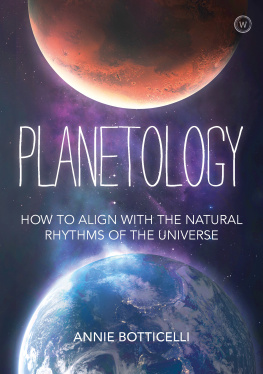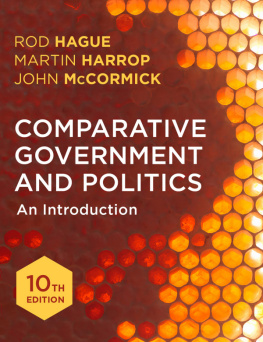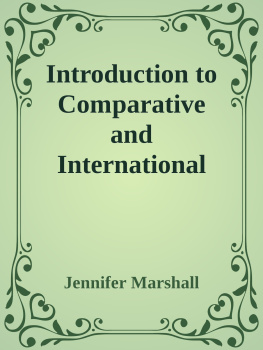Lukáš Likavčan - Introduction to Comparative Planetology
Here you can read online Lukáš Likavčan - Introduction to Comparative Planetology full text of the book (entire story) in english for free. Download pdf and epub, get meaning, cover and reviews about this ebook. year: 2019, publisher: Strelka Press, genre: Romance novel. Description of the work, (preface) as well as reviews are available. Best literature library LitArk.com created for fans of good reading and offers a wide selection of genres:
Romance novel
Science fiction
Adventure
Detective
Science
History
Home and family
Prose
Art
Politics
Computer
Non-fiction
Religion
Business
Children
Humor
Choose a favorite category and find really read worthwhile books. Enjoy immersion in the world of imagination, feel the emotions of the characters or learn something new for yourself, make an fascinating discovery.
- Book:Introduction to Comparative Planetology
- Author:
- Publisher:Strelka Press
- Genre:
- Year:2019
- Rating:3 / 5
- Favourites:Add to favourites
- Your mark:
- 60
- 1
- 2
- 3
- 4
- 5
Introduction to Comparative Planetology: summary, description and annotation
We offer to read an annotation, description, summary or preface (depends on what the author of the book "Introduction to Comparative Planetology" wrote himself). If you haven't found the necessary information about the book — write in the comments, we will try to find it.
Introduction to Comparative Planetology — read online for free the complete book (whole text) full work
Below is the text of the book, divided by pages. System saving the place of the last page read, allows you to conveniently read the book "Introduction to Comparative Planetology" online for free, without having to search again every time where you left off. Put a bookmark, and you can go to the page where you finished reading at any time.
Font size:
Interval:
Bookmark:
Introduction to Comparative Planetology
Luk Likavan
Special thanks to those who commented on the early stages of this manuscript: Bohuslav Binka, Nicolay Boyadjiev, Benjamin Bratton, Paul Heinicker, Bogna M Konior, Theo Merz, Jussi Parikka, Anna Remeov, Manuel Scholz-Wckerle, Whitney Stark, and Solveig Suess.
This essay has been developed with the generous support of Strelka Institute for Media, Architecture and Design, Moscow, and Department of Environmental Studies, Faculty of Social Sciences, Masaryk University, Brno. This essay was partially written within the framework of the Fellowship program of BAK, basis voor actuele kunst, Utrecht.
This publication was written at the Academy of Performing Arts in Prague with the support of the Institutional Endowment for the Long Term Conceptual Development of Research Institutes, as provided by the Ministry of Education, Youth and Sports of the Czech Republic in 2019.
Chapter II, Chapter III, and Chapter IV were based on an earlier essay published as It Came Out of the Blue: Fragment of Comparative Planetology, in The Most Beautiful Catastrophe, ed. Jakub Gawkowski (CSW Kronika Bytom, 2018).
Chapter VI and Chapter VII were based on an earlier essay published as Spectral Earth, or Designing Culture for Extinction, in CABAL no. 1, ed. Chiara di Leone (2019).
When the US Department of Energy rebranded natural gas as molecules of freedom in late May 2019,
In turn, it is not just disasters such as fires in the Amazon rainforest or the Congo basin that are rendered in this perspective political because of a massive release of CO2 combined with a gradual loss of natural carbon capture capacities provided by vegetation. When the EU, at the beginning of September 2019, considered declaring a potential no-deal Brexit a major natural disaster, it made perhaps unwittingly yet another gesture towards politics-to-come: the socio-economic consequences of Britain leaving the EU are also a planetary chemical event, just as the ongoing trade war between China and the US or a looming conflict between Iran and Saudi Arabia with its allies. For example, the slowdown of international trade affected by such events can be mapped into relative fluctuations in CO2 emissions or in resource extraction.
Comparative planetology
The politics-to-come depart from very different sets of fundamental assumptions and are informed by very different philosophical and visual imaginations of the planet the way we envisage our planet through concepts, theories, maps, paintings, photographs, videos, buildings and architectural drawings, computer models, graphs, books, and other cultural artifacts. Studying and comparing different kinds of these imaginations, as well as preparing their alternative articulation, belongs to a philosophical endeavour that might be after science fiction writer Kim Stanley Robinson called comparative planetology .
Despite what he meant by this term having more to do with comparing different celestial bodies in terms of the composition of their atmosphere or soil, I would like to direct this quest into the properly philosophical realm, following the conviction that our models, concepts, and visions of Earth itself need thorough comparative study first. In this realm, comparative planetology turns out to be more than just a description of different conceptions of the planet it maps these imaginations on to geopolitical space. In other words: imaginations of the planet reflect different geopolitical arrangements, and following the thesis on politics-to-come these geopolitical spaces crucially translate into different geophysical and biochemical realities on the planetary scale. Comparative planetology thus allows us to ask questions such as For what Earth do we design? or What geopolitical tendencies does our imagination of Earth endorse?
Comparative planetology contributes to an emergence of a solid theoretical conceptualisation of the planet in contemporary thinking about politics, media, design, and architecture. We increasingly refer to planetary entanglements, planetary conditions, the planetary ecosystem, planetary-scale computation, planetary megacities, and so on; but closely scrutinised, we discover how these rhetorical gestures might in some cases turn out to be vacuous, especially once they turn into common currency in intellectual cultures. There is already a body of work related to contemporary conceptualisations of the planet, spanning Lynn Margullis and James Lovelocks Gaia (recently reinterpreted by Bruno Latour) through treatises of contemporary philosophers (Ray Brassier, Eugene Thacker, Ben Woodard); from recent updates on the conceptualisations of the planet by Peter Sloterdijk, Jennifer Gabrys, Benjamin Bratton, and William Connolly, to the works of anthropologists and post-colonial thinkers such as Gayatri Chakravorty Spivak, Achille Mbembe, or Anna Tsing. Comparative planetology compares existing intuitive conceptions of the planet and proposes new ones, while simultaneously building a framework instructive for political, design, and architectural interventions.
Infrastructural geopolitics of planetary coordination
The need for a different imagination of Earth is motivated by the urgent political implications of the climate emergency, and above all the lack of technique for planetary coordination of climate emergency mitigation. It becomes clear that the climate crisis is not simply a political problem it is, properly speaking, a geopolitical affair since it transcends nation state boundaries both in its causes and effects. However, as we have repeatedly seen since Rio 1992 (and even despite Paris 2015), attempts to coordinate climate emergency mitigation do not reach satisfactory results. The most recent conferences the December 2018 COP24 in Katowice and the September 2019 UN Climate Action Summit in New York prove this point: the unsatisfactory results demonstrate an inability on the part of the international community to bring mitigation efforts into practice. For this reason, it might be time to reconsider whether the geopolitical dimension of the climate crisis should not be rendered anew. This can mean among other things reassessing the role of nation states as sovereign actors of ecological geopolitics, given that the hollowing out of their functions the last 3040 years of wild neoliberalisation has led to a situation in which they lack the instruments for planetary coordination (with one major exception, which is their military power). So how should the climate crisis be perceived outside of the geopolitical space of nation states?
The alternative geopolitical space of comparative planetology is infrastructure space . Any orchestration of a large collection of humans and nonhumans requires an infrastructural power based on deploying large-scale socio-economic technologies that operate as active forms that standardise tendencies and regimes of engagement between bodies in space:
To mobilise this kind of infrastructural power in relation to climate emergency mitigation, we need however to understand anew the geo in geo political; neglecting the Westphalian conditions that give rise to the situation of globalisation (named after the Treaty of Westphalia in 1648, which instituted an international order of sovereign nation states in Europe). Under these conditions, nation states are treated as subjects of global action, while they are actually losing the capacity to control global affairs, and infrastructures are seen as shady mechanisms in the background of geopolitics. We need to flip the figure and the background, and recognise infrastructures as one of the major planetary agencies we have at our disposal, as they can intervene where nation states alone fail. But before doing so, we must make clear what actually is the object we aim to save from runaway climate catastrophe i.e. what we talk about when we discuss the planet. That is the business of comparative planetology as a philosophical genre.
Font size:
Interval:
Bookmark:
Similar books «Introduction to Comparative Planetology»
Look at similar books to Introduction to Comparative Planetology. We have selected literature similar in name and meaning in the hope of providing readers with more options to find new, interesting, not yet read works.
Discussion, reviews of the book Introduction to Comparative Planetology and just readers' own opinions. Leave your comments, write what you think about the work, its meaning or the main characters. Specify what exactly you liked and what you didn't like, and why you think so.












